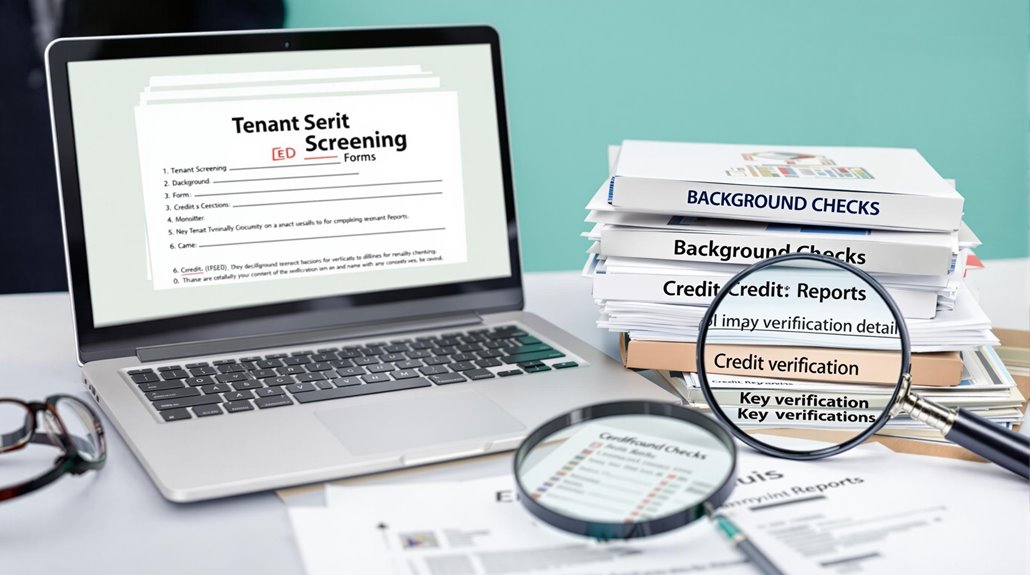A thorough tenant screening process guarantees you find reliable, long-term renters who pay on time and care for your property. Start with a detailed application and checklist to gather essential information. Conduct background checks, verify income, and confirm rental history. Use screening tools like TransUnion SmartMove for accurate reports. Always follow fair housing laws to avoid discrimination claims. Discover how these steps can help you secure quality tenants and protect your investment.
Key Takeaways
- Implement a thorough tenant screening checklist to verify credit, income, and rental history for long-term reliability.
- Conduct background checks, including criminal and eviction history, to identify trustworthy applicants.
- Use tenant screening tools like TransUnion SmartMove for efficient and comprehensive applicant evaluations.
- Perform detailed tenant interviews to assess communication skills and compatibility with rental terms.
- Ensure compliance with Fair Housing Act and Fair Credit Reporting Act to avoid legal risks.
Importance of Tenant Screening Process for Long-Term Rentals
While finding tenants quickly might seem appealing, neglecting a thorough screening process can lead to significant long-term challenges. Effective tenant screening helps you identify reliable renters who are financially stable and have a positive rental history, reducing the risk of late payments or evictions. By reviewing a rental application and conducting thorough background checks, you can verify income, creditworthiness, and past behavior, guaranteeing tenants meet your criteria. This process not only stabilizes your rental income but also minimizes turnover rates, saving you time and money. Additionally, a systematic approach to tenant screening guarantees compliance with the Fair Housing Act, protecting you from discrimination claims. Selecting quality tenants enhances your landlord reputation, attracting responsible applicants who maintain the property and contribute to a positive community. Investing in a robust screening process is essential for securing long-term rentals and avoiding costly pitfalls.
Key Components of a Comprehensive Tenant Screening Process
Successful tenant screening relies on a well-structured process that evaluates potential renters thoroughly and consistently. Start by implementing a detailed tenant application process to gather essential information, such as employment history and references. Use a tenant screening checklist to guarantee you cover all verification steps, including credit checks to assess financial obligations and criminal background checks to identify potential risks. Income verification is vital to confirm prospective tenants can afford the rent, while rental history verification helps gauge their reliability and care for previous properties. Using Tenant Screening Solutions can simplify and automate these crucial steps for efficient and accurate evaluations. Background screening, which includes these components, provides a holistic view of an applicant’s suitability. Always adhere to the Fair Credit Reporting Act (FCRA) by securing written consent before accessing sensitive data and providing necessary disclosures if an application is denied. A systematic approach minimizes oversights and guarantees you select qualified, long-term renters.
Essential Background Checks and Verifications

A thorough tenant screening process involves verifying key aspects of an applicant’s background to evaluate their suitability. Start by conducting background checks that include credit history, eviction history, and criminal records to assess financial responsibility and safety. Use tenant screening services to streamline this process and gain detailed reports. Verify rental history by contacting previous landlords to confirm timely payments and property care. Additionally, perform income verification through pay stubs, W-2 forms, or direct employer confirmation to ascertain potential tenants can afford the rent. These steps help identify reliable tenants, reducing risks and fostering positive landlord-tenant relationships. Implementing long-term rental CRM systems can further enhance tenant management efficiency by automating these verification processes and maintaining accurate records.
| Check | Purpose |
|---|---|
| Credit History | Assess financial responsibility |
| Rental History | Confirm reliability and behavior |
| Income Verification | Ascertain affordability of rent |
Best Practices for Conducting Tenant Interviews
To guarantee a thorough tenant screening process, conducting structured tenant interviews is essential. Start by preparing a list of standard applicant questions focused on rental history, income stability, and reasons for moving. This guarantees consistency in tenant evaluations and helps verify application details. Use the interview to assess communication skills, as these reflect how applicants may interact with neighbors and maintain the property. Clearly discuss rental terms and expectations, fostering transparency and allowing applicants to understand their responsibilities. If renting to pet owners, conduct separate pet interviews to assess compatibility and confirm adherence to property guidelines. By addressing these factors, you’ll enhance your tenant screening best practices and reduce potential issues. A well-structured interview not only clarifies discrepancies but also provides insights into an applicant’s suitability for a long-term rental arrangement. Understanding tenant demographics and aligning questions with their specific needs can further improve the quality of your tenant interviews.
Utilizing Tenant Screening Tools and Resources

Beyond structured interviews, leveraging tenant screening tools and resources guarantees a robust evaluation process. Tools like TransUnion SmartMove offer extensive background reports, including credit checks and eviction histories, enabling you to assess applicants’ credit history and reliability swiftly. Rental history databases provide insights into past tenant behavior, such as timely payments and property maintenance, ensuring you select responsible renters. Online platforms streamline the tenant screening process, allowing you to collect and review applications efficiently while adhering to fair housing laws. Engaging professional tenant screening services saves time by conducting thorough evaluations of credit, criminal backgrounds, and rental references. Always ensure compliance with the Fair Credit Reporting Act and local laws to minimize risks. By integrating these tools and resources, you’ll make informed decisions, safeguard your property, and secure long-term, dependable tenants. Additionally, utilizing Google Analytics can help you optimize your rental property website to attract and retain quality applicants.
Conclusion
Just as a fisherman carefully selects the right bait to catch quality fish, you must invest in a thorough tenant screening process to secure reliable, long-term renters. Over 60% of landlords face eviction risks due to poor tenant selection, but by conducting background checks, verifying income, and conducting interviews, you reduce those odds considerably. Use screening tools as your net to filter out unqualified applicants, ensuring your property is in capable hands for years to come.




